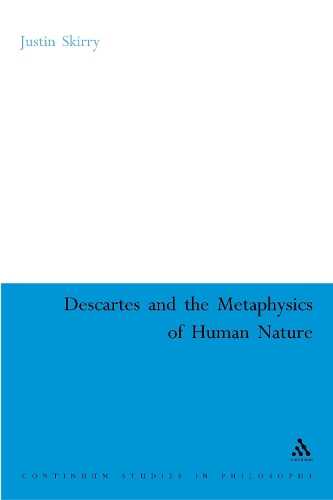
Descartes and the Metaphysics of Human Nature
(Hardback)
Publishing Details
Descartes and the Metaphysics of Human Nature
By (Author) Dr. Justin Skirry
Bloomsbury Publishing PLC
Continuum International Publishing Group Ltd.
27th November 2005
United Kingdom
Classifications
Tertiary Education
Non Fiction
Philosophical traditions and schools of thought
110
Physical Properties
Hardback
208
Width 156mm, Height 234mm
420g
Description
The traditional account of mind/body union attributed to Descartes supposes that the immaterial, thinking mind and the material, non-thinking body interact by means of efficient causation - that the mind causes events in the body, e.g. the voluntary raising of an arm, and vice versa, e.g. the visual sensation of a tree. But this gives rise to a notorious philosophical problem: how can this causal interaction occur between the spiritual mind and the physical body since they have absolutely nothing in common and cannot come into contact with one anotherJustin Skirry's book shows how Descartes in fact avoids this enormous problem. Skirry argues, through a critical re-examination of Cartesian metaphysics, that the union of mind and body is not, as most scholars have always maintained, constituted by efficient causal interaction for Descartes, because this would not result in one, complete human nature but in an aggregate of two numerically distinct natures. Descartes argues in the 6th Meditation and elsewhere that mind/body union is constituted by what the scholastics called a 'substantial union', i.e. the union that form (mind) has with matter (body). This substantial union produces a whole that is more than the sum of its parts; the capacity for modes of sensation and voluntary bodily movement are emergent properties of the whole, substantially united mind and body. Therefore, the 'Cartesian' problem of mind-body efficient causal interaction is avoided altogether, since efficient causal occurrences between mind and body play no role in explaining the existence of these modes.
Reviews
'Skirry's book is an excellent synthesis of patient scholarship and sober philosophy: it illustrates the power and importance of approaching famous texts and philosophical problems with historical sensitivity.' Jan A. Cover, Purdue University * Blurb from reviewer *
Author Bio
Justin Skirry (PhD., Purdue) is Assistant Professor of Philosophy at Nebraska-Wesleyan University in Lincoln, Nebraska, USA. He has published papers in the Journal of the History of Philosophy, History of Philosophy Quarterly and elsewhere.
